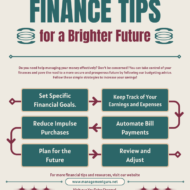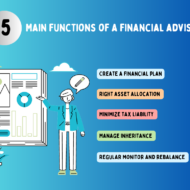Currently Browsing: Financial Management
Posted by Managementguru in Financial Management, How To, Personal Finance
on Aug 23rd, 2023 | 0 comments

Managing personal finances is crucial for achieving financial stability and building wealth. Here are ten best personal finance tips to help you make smart decisions and improve your financial situation. Create a Budget Develop a budget to track your income and expenses. Allocate your money to cover necessary expenses, savings, and debt repayment, and be mindful of discretionary spending. Save and Invest Make saving a priority. Aim to save a portion of your income each month and invest it wisely to grow your wealth over time. Consider diversifying your investments and seek professional advice if needed. Minimize Debt Avoid excessive debt and work on reducing existing debt. Prioritize high-interest debts, such as credit card debt, and consider strategies like debt consolidation or negotiation to lower interest rates. Emergency Fund Build an emergency fund to cover unexpected expenses, such as medical bills or car repairs. Aim to save three to six months’ worth of living expenses to provide a safety net during challenging times. Track Your Expenses Monitor your spending habits and identify areas where you can cut back. Use personal finance apps or spreadsheets to track your expenses and gain insights into your financial behavior. Plan for Retirement Start saving for retirement as early as possible. Contribute to employer-sponsored retirement plans, like 401(k) or IRA, and take advantage of any matching contributions. Explore other retirement savings options available to you. Insurance Coverage Assess your insurance needs and ensure you have adequate coverage for health, life, home, and auto insurance. Insurance can protect you from unexpected financial setbacks. Avoid Impulsive Purchases Before making a purchase, especially big-ticket items, consider if it aligns with your financial goals. Avoid impulsive buying and practice mindful spending. Continuous Learning Invest in financial literacy. Read books, follow reputable personal finance blogs, or take online courses to enhance your knowledge about money management, investing, and financial planning. Seek Professional Advice If you’re overwhelmed or unsure about your financial decisions, consult with a certified financial planner or advisor. They can provide guidance tailored to your circumstances and help you create a comprehensive financial plan. Remember, personal finance is a long-term game. Consistency, discipline, and ongoing evaluation of your financial strategies are essential for achieving your...

Posted by Managementguru in Financial Management, How To, Personal Finance
on Jul 4th, 2023 | 0 comments

Your 20s are an exciting time filled with new experiences and opportunities, and it’s also a crucial period for setting the stage for your financial future. By establishing smart money goals early on, you can build a solid foundation for financial success and achieve your long-term dreams. In this blog post, we will discuss five essential money goals that every twenty-something should consider pursuing. From budgeting and saving to investing and building credit, these goals will help you make the most of your finances and set you on a path towards a secure and prosperous future. Goal 1: Create and Stick to a Budget One of the most important money goals for your 20s is creating a budget and, more importantly, sticking to it. A budget allows you to gain control over your finances, track your expenses, and ensure that you’re living within your means. Start by listing your monthly income and categorizing your expenses. Identify areas where you can cut back and allocate your money towards savings, debt repayment, and essential expenses. Utilize budgeting apps and tools to streamline the process and stay on top of your financial health. By mastering the art of budgeting early on, you’ll develop responsible spending habits that will serve you well throughout your life. Goal 2: Build an Emergency Fund Life is full of unexpected twists and turns, and having a financial safety net in the form of an emergency fund is crucial. Aim to save three to six months’ worth of living expenses in a separate account that you can access in case of unexpected events like medical emergencies, car repairs, or job loss. Start small if necessary, but make consistent contributions to your emergency fund. Automate your savings by setting up direct deposits and make it a priority in your budget. Having an emergency fund will provide peace of mind and prevent you from falling into debt or relying on credit cards during challenging times. Goal 3: Start Investing Early While retirement may seem far off in your 20s, starting to invest early is a powerful tool for building long-term wealth. Take advantage of compound interest by investing in retirement accounts like a 401(k) or an Individual Retirement Account (IRA). If your employer offers a matching contribution, contribute at least enough to receive the full match—it’s essentially free money. Additionally, consider investing in low-cost index funds or exchange-traded funds (ETFs) to diversify your portfolio. The power of compounding will allow your investments to grow over time, giving you a significant advantage in reaching your financial goals. Goal 4: Manage Debt Responsibly Whether it’s student loans, credit card debt, or a car loan, managing your debt responsibly is crucial in your 20s. Start by understanding the terms and interest rates of your debts, and create a plan to pay them off strategically. Prioritize high-interest debt first, while making minimum payments on other obligations. Consider debt consolidation or refinancing options to reduce interest rates and make repayment more manageable. Avoid accruing new debt whenever possible, and use credit cards responsibly, paying off the balance in full each month. By tackling your debts head-on and developing healthy financial habits, you’ll set yourself up for a future free from the burden of excessive debt. Goal 5: Build and Maintain a Good Credit Score Your credit score plays a vital role in your financial life, influencing your ability to secure loans, rent an apartment, or even land a job. Building and maintaining a good credit score is an essential money goal for your 20s. Start by understanding the factors that impact your credit score, such as payment history, credit utilization, and length of credit history....

Posted by Managementguru in How To, How to make money online, Social Media, Video Marketing
on Jul 2nd, 2023 | 0 comments

Making money on YouTube without showing your face is certainly possible. Here are some strategies you can use: Create screen-capture videos You can create tutorial videos, software reviews, gaming content, or presentations where you record through your computer screen while providing voice-over narration. This allows you to share valuable information without revealing your face. Animated videos Use animation software or tools to create engaging and informative videos. You can use animations, text, and graphics to convey your message or tell a story. There are various animation styles you can explore, such as whiteboard animations, 2D animations, or motion graphics. Voice-over videos If you’re comfortable with your voice but don’t want to show your face, consider creating voice-over videos. You can use slides, images, or video clips to support your voice-over narration. This works well for storytelling, educational content, or commentary videos. Tube Automate: A Beginner’s Guide To Making $5,000/mo With YouTube Automation Niche channels Focus on a specific niche or topic that doesn’t require your face to be on camera. Examples include audio production, nature documentaries, ASMR, narrating stories, or historical analysis. Find a niche that you’re passionate about and create content around it. Secrets to Growing a Successful YouTube Channel in 2023 Collaborations Instead of creating content on your own, collaborate with other YouTubers who are comfortable showing their faces. You can contribute your expertise, voice-over narration, or animation skills to their videos while still benefiting from the exposure and potential revenue. Podcasting Start a podcast where you discuss topics of interest, interview guests, or share insights. While podcasts are audio-focused, you can also upload the episodes to YouTube with relevant images or graphics as a static visual element. Focus on video production quality If you’re not showing your face, it’s crucial to compensate with high-quality video production. Invest in good equipment such as a quality microphone for clear audio and editing software to enhance your videos. Engaging visuals, appealing graphics, and well-crafted content can help retain viewership. Remember, to monetize your YouTube channel, you’ll need to meet certain eligibility requirements, such as having at least 1,000 subscribers and 4,000 watch hours in the last 12 months. Once you meet these requirements, you can apply for the YouTube Partner Program and explore monetization options such as ads, sponsorships, merchandise, or crowdfunding. Can I use Creative Commons videos on YouTube and monetize? It is important to respect copyright laws and intellectual property rights when using content from other creators. Reuploading someone else’s Creative Commons videos without proper attribution or permission may infringe on their rights. However, if you want to use Creative Commons videos in a legal and ethical manner, here are the steps you can follow: Understand Creative Commons licenses Creative Commons licenses provide a range of permissions for creators to specify how their work can be used. Familiarize yourself with the different types of Creative Commons licenses and their specific requirements. Each license may have different conditions, such as providing attribution to the original creator or sharing the derivative work under the same license. Search for Creative Commons videos There are several platforms where you can find Creative Commons videos, such as YouTube, Vimeo, or dedicated Creative Commons repositories like Pixabay or Wikimedia Commons. Use the advanced search filters on these platforms to specifically look for Creative Commons-licensed content. Review the license terms Once you find a video that you want to use, make sure to review the license terms associated with it. Check for any restrictions, requirements, or conditions specified by the license. Some licenses may allow you to use the video for commercial purposes, while others may have limitations. Attribute the original creator If the...

Posted by Managementguru in Construction, Financial Management, How To
on Jun 10th, 2023 | 0 comments

In an era of rising energy costs and growing environmental concerns, adopting eco-friendly practices at home is more crucial than ever. By making a few simple changes and incorporating energy-saving strategies, you can significantly reduce your carbon footprint and save money on utility bills. In this article, we will explore practical tips to make your home more eco-friendly and provide long-term financial benefits. Upgrade to Energy-Efficient Appliances Upgrading your appliances to more energy-efficient options is a great way to reduce your home’s energy consumption. While you may spend more initially to upgrade your appliances, it’s a great way to reduce your carbon footprint and also helps you save money in the long run. Look for appliances with Energy Star ratings, as they are designed to use less electricity without compromising performance. Replace older models with energy-efficient refrigerators, washing machines, dishwashers, and air conditioners to enjoy substantial energy savings. Optimize Home Insulation A well-insulated home can help to maintain temperature better, limiting the need for extreme cooling or heating, which can save you money and make your home more eco-friendly. Ensure your attic, walls and floor are insulated to avoid heat loss in winter, and heat gain in summer. Sealing gaps around windows and doors with weatherstripping or caulk also prevents drafts, improving overall energy efficiency. Consider installing double-glazed windows to enhance insulation further. Harness Natural Light Natural light is better for our well-being than harsh artificial light. Plus, it’s also more cost-effective and more energy efficient. So, throw open the curtains in the morning instead of reaching for the light switch. When artificial lighting is necessary, opt for energy-efficient LED bulbs. LED lights consume significantly less energy and have a longer lifespan compared to traditional incandescent bulbs. You may also want to consider installing smart lighting systems to ensure your lights are automatically off if you’re not in the room. These methods will help you lower your electricity consumption and create a more eco-friendly home. Smart Thermostats for Energy Efficiency A smart thermostat is a valuable addition to your energy-saving arsenal. These devices connect to your home’s heating and cooling systems, allowing you to optimize your temperature settings and save energy with a smart thermostat. You can take advantage of features such as programmable settings, learning capabilities, and remote access. This can help you set energy-saving temperature ranges, schedule adjustments based on your daily routine, and even control settings using voice commands. By reducing water consumption, you can save money and energy. Water Conservation Strategies When making your home a more eco-friendly space, you must consider your water consumption. Consider installing low-flow shower heads and faucets to reduce water usage without sacrificing water pressure. You may also want to look around for any leaky faucets or toilets. Anything that is leaking and wasting water should be rectified. It’ll prevent waste, save energy, and save you money on your bills too. Transforming your home into an energy-efficient and eco-friendly haven doesn’t have to be complicated. These five simple practices will benefit your wallet, while also contributing to a more sustainable...

Posted by Managementguru in Business Management, Financial Management, Personal Finance, Strategy
on May 31st, 2023 | 0 comments

A lot of entrepreneurs are a little too prideful and controlling for their own good. They like to sort out and organize every aspect of their business to ensure it perfectly fits their vision. There’s just one issue: no single person is able to cover every element of their business to a sufficient standard. Even if they are capable in many different areas, a business owner doesn’t have the time to complete everything successfully. This can certainly be the case when it comes to organizing their finances and making future business decisions. This is why it makes sense to hire a local financial advisor. Not convinced? Here are five reasons to bring in this professional help for your business. 1. Expertise in a specialist area It’s no secret that finance is a tricky subject to delve into – particularly for those that are not well-versed in this area. Yes, looking at your revenue and expenses is a relatively easy task, but there’s a lot more to your financials than that. Think about your taxes, the laws you have to follow, judging investments, and so on. With a financial advisor on your side, you suddenly benefit from their expertise. This means your business finances can be maximized when an advisor reviews your situation on a frequent basis to ensure your money is being spent the right way. 2. Local knowledge and support As for why you should go locally with a financial advisor, there are various reasons why this is the case. Say your company is based in Stuart, Florida. Rather than picking a professional in a different state or even city, you can hire a financial advisor in Stuart, Florida to help your business. You will be able to easily meet up with your advisor in person, which really helps you to understand what is going on. Their knowledge on local laws and regulations, how items are enforced and so on can really help you to get the best advice available. 3. A long-term strategy A professional financial advisor is able to assist your business in numerous ways. One of the most valuable is how they can help you to map out a long-term strategy to follow. With a comprehensive plan in place, there’s no guesswork and ending up in the wrong location. An advisor can tell you the destination, how to get there, and what moves to make if any problems do occur. 4. Save money It’s true: you have to pay for the services of a local financial advisor. However, the long-term savings you gain justify this initial outlay. Ultimately, an advisor is there to improve your finances by suggesting the best financial decisions for your situation. That means you are more likely to maximize your profit margins. 5. Lower stress levels Stress is a natural part of running a business. That said, you can relieve at least some of that stress by bringing a financial advisor on board. You are safe in the knowledge your finances are receiving the right level of attention where the right investments are being made to support your company’s...










